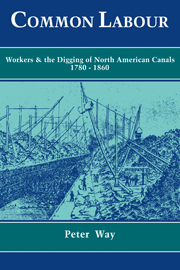Book contents
- Frontmatter
- Contents
- List of tables
- Acknowledgements
- Chronology of construction for main canals
- Abbreviations
- Map: Main canals of the North American Canal Era, 1780–1860
- Introduction
- 1 Early canals, 1780–1812
- 2 “As low as labor and capital can afford”: the contracting system, 1817–1840
- 3 “Human labor, physical and intelligent”
- 4 Payment “fit for labouring people”
- 5 The greatest quantity of labour
- 6 “Canawlers and citizens”
- 7 “Guerilla war”: labour conflict in the 1830s
- 8 “This new order of things”: the 1840s–1850s
- Conclusion
- Appendix 1 Tables 1–16
- Appendix 2 Tables 17–18
- Index
8 - “This new order of things”: the 1840s–1850s
Published online by Cambridge University Press: 03 November 2009
- Frontmatter
- Contents
- List of tables
- Acknowledgements
- Chronology of construction for main canals
- Abbreviations
- Map: Main canals of the North American Canal Era, 1780–1860
- Introduction
- 1 Early canals, 1780–1812
- 2 “As low as labor and capital can afford”: the contracting system, 1817–1840
- 3 “Human labor, physical and intelligent”
- 4 Payment “fit for labouring people”
- 5 The greatest quantity of labour
- 6 “Canawlers and citizens”
- 7 “Guerilla war”: labour conflict in the 1830s
- 8 “This new order of things”: the 1840s–1850s
- Conclusion
- Appendix 1 Tables 1–16
- Appendix 2 Tables 17–18
- Index
Summary
So all you young labouring heroes get ready and come away,
And sail to the sweet land of freedom where no poor rates or taxes to pay
It's there that the dollars are plenty, employment without any fail,
You'll have beef and mutton for dinner, instead of your coarse Indian meal.
Writing in 1843 at the height of labour unrest on Canada's canals, Charles Atherton, the superintending engineer of the Lachine Canal, attributed the violence to “the delusive expectations which Emigrants have been led to form in leaving their native Land.” Rather than moving onto the soil as farm labour, “yielding the natural remuneration of food, with moderate wages in cash,” they opted for work that offered “temporary high wages payable in Coin. Hence their misery, for the highest rate of wages to be earned at a temporary Public Work, is but poor compensation for a wandering life. Poverty & discontent are the natural consequences of such an error.” While misleading about the amount of opportunity available, Atherton was nonetheless clear on life in canal construction. “Public Works are demoralizing at best, & should … be carried on as far as possible by the local population, & be regarded as the mere helping hand, not the dependence, of the Emigrant.” A more sympathetic Lewis Drummond, Member for Portneuf, agreed that immigrant labourers were poor and dependent. “They were to have found continued employment, and been enabled to acquire means to purchase property of their own,” he chastised Canada's Legislative Assembly in 1845.
- Type
- Chapter
- Information
- Common LabourWorkers and the Digging of North American Canals 1780–1860, pp. 229 - 264Publisher: Cambridge University PressPrint publication year: 1993



